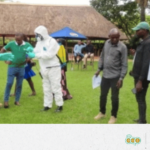Caribbean: Participatory training on implementation of official controls
- 09/07/2021
- Posted by: Gaetan Dermien
- Category: Antigua and Barbuda, Barbados, Caribbean, Guyana, Jamaica

In June, a third virtual training course on implementing official controls was provided for inspectors in the Caribbean.
Inspectors from Antigua and Barbuda, Barbados, Guyana and Jamaica took part in the training, which involved eight interactive Zoom sessions, including participatory group assignments and presentations. A special session was also provided in Dutch for Suriname, with a blended programme of face-to-face and digital training.
The 24 participants’ different experience and knowledge provided opportunities for sharing and learning, including via a WhatsApp group. During the online sessions participants freely made interventions and inputs, which helped to generate lively discussion of issues across the groups.
This training is aimed at inspectors, controllers and technical agents involved in carrying out phytosanitary control, inspection and certification activities at the level of National Plant Protection Organisations. It focuses on the importance of International Standards for Phytosanitary Measures (ISPMs) and their application in relation to the requirements of the International Plant Protection Convention (IPPC). It introduces the the regulatory context and the evolution of EU plant health legislation, in particular in relation to EU Regulation 2016/2031. Participants learn how to carry out phytosanitary control, inspection and certification activities in accordance with procedures and instructions; to carry out a sampling plan; to properly complete additional declarations on phytosanitary certificates; and to understand the requirements for documentation, traceability and reporting of official control activities.
This business support is provided through the Fit For Market SPS programme, implemented by COLEACP within the Framework of Development Cooperation between the Organisation of African, Caribbean and Pacific States (OACPS) and the European Union.



![EU and GB MRL changes in 2025 (January-March 2025) 9-FFM+-[ENG]](https://news.colead.link/wp-content/uploads/2024/06/9-FFM-ENG-150x150.jpg)
